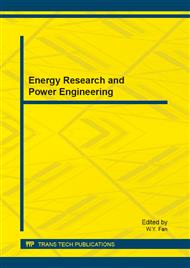[1]
V.P. Sakthivel, R. Bhuvaneswari, S. Subramanian, Multi-objective Parameter Estimation of Induction Motor Using Particle Swarm Optimization. Engineering Applications of Artificial Intelligence. 2010; Vol. 23: 302-312.
DOI: 10.1016/j.engappai.2009.06.004
Google Scholar
[2]
Nangsue P, Pillay P, Conry S. Evolutionary Algorithms for Induction Motor Parameter Determination. IEEE Transactions Energy Conversion. 1999; Vol. 14: 447-453.
DOI: 10.1109/60.790895
Google Scholar
[3]
Orlowska Kowalska, Lis J, Szabat K. Identification of The Induction Motor Parameters Using Soft Computing Methods. Computation and Mathematics in Electrical and Electronics Engineering. 2006; Vol. 25: 181-192.
DOI: 10.1108/03321640610634434
Google Scholar
[4]
Rahimpour E, Rashtchi V, Pesaran M. Parameter Identification of Deep-bar Induction Motors Using Genetic Algorithm. Electrical Engineering. 2007; Vol. 89: 547-552.
DOI: 10.1007/s00202-006-0039-x
Google Scholar
[5]
Abdelhadi B, Benoudjit A, Nait Said. Identification of Induction Machine Parameters Using an Adaptive Genetic Alogrithm. Electric Power Components And Systems. 2004; Vol. 32: 767-784.
DOI: 10.1080/15325000490466645
Google Scholar
[6]
Ursem RK, Vadstrup P. Parameter Identification of Induction Motors Using Differential Evolution. The 2003 Congress on Evolutionary Computation, Canberra, 2003: 790-796.
DOI: 10.1109/cec.2003.1299748
Google Scholar
[7]
Fogel DB, Evolutionary Computation: Toward a New Philosophy of Machine Intelligence, second IEEE Press, Piscataway, NJ. (2000).
Google Scholar
[8]
Li Li-xiang, Peng Hai-peng, Wang Xiang-dong, et al. PID parameter tuning based on chaotic ant swarm, Chinese Journal of Scientific Instrument, 2006; Vol. 27: 1104-1106.
Google Scholar
[9]
Li Li-xiang, Yang Yi-xian, Peng Hai-peng, et al. Parameters Identification of Chaotic Systems Via Chaotic Ant Swarm. Chaos, Solitons & Fractals, 2006; Vol. 28: 1204-1211.
DOI: 10.1016/j.chaos.2005.04.110
Google Scholar
[10]
Li LX, Peng Hai-peng, Wang Xiang-dong, et al. An optimization method inspired by chaotic, ant behavior. International Journal of Bifurcation and Chaos, 2006; Vol. 16: 2351-2364.
DOI: 10.1142/s0218127406016100
Google Scholar
[11]
Li Li-xiang, Peng Hai-peng, Yang Yi-xian, et al. Parameter estimation for Lorenz Chaotic systems based on chaotic ant swarm algorithm, Acta Phys, 2007; Vol. 56: 51-55.
DOI: 10.1049/cp:20062088
Google Scholar
[12]
V.P. Sakthivel, R. Bhuvaneswari, S. Subramanian, Bacterial foraging Technique Based Parameter Estimation of Induction Motor from Manufacturer Data, Electric Power Components and Systems, 2010; Vol38: 657-674.
DOI: 10.1080/15325000903489660
Google Scholar


